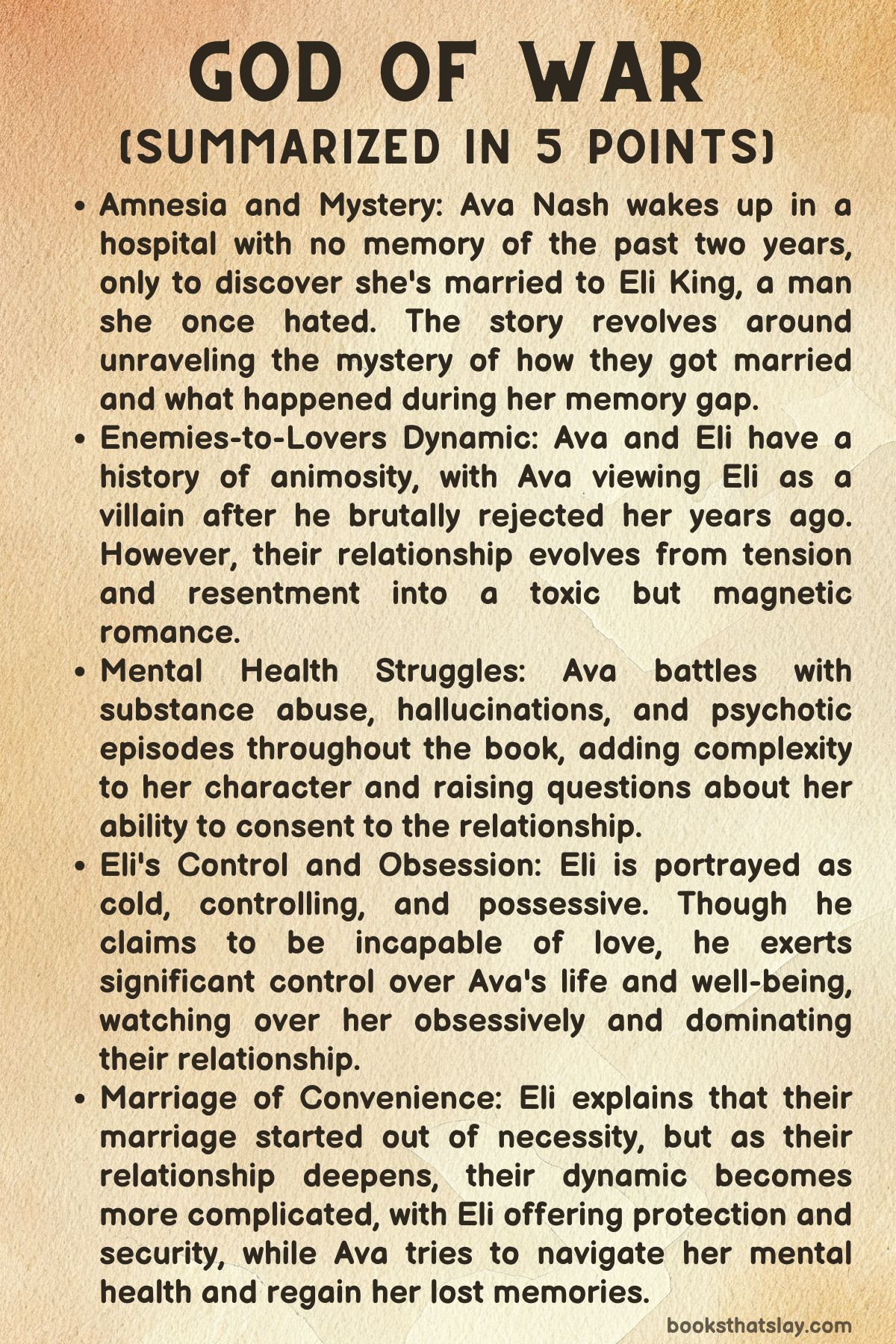God of War by Rina Kent Summary, Characters and Themes
God of War by Rina Kent is a contemporary romance that delves into the complexities of toxic relationships, manipulation, and healing. The story follows Ava, a young woman battling mental health issues, addiction, and a fractured relationship with her family.
She finds herself entangled in a controlling marriage with Eli King, a cold, manipulative man with a mysterious past. The narrative explores the emotional and psychological challenges Ava faces as she tries to piece together the truth about her marriage while grappling with her own self-identity and trauma. As Ava’s journey unfolds, the themes of love, control, and personal redemption take center stage, culminating in a transformative exploration of healing and reconciliation.
Summary
Ava is a young woman struggling with mental health issues, substance abuse, and a broken relationship with her family. She spends her nights in chaotic clubs, masking her pain with alcohol, drugs, and reckless behavior.
Despite the concern of her best friend, Cecily, Ava resists any attempts at intervention, continuing to spiral into self-destructive patterns. She is also haunted by the failure of a cello competition she once hoped would define her future, adding to her growing sense of inadequacy.
Her chaotic behavior culminates in a confrontation with Eli King, a figure from her past who seems to hold unsettling power over her.
Eli is cold, indifferent, and dismissive of Ava, which only fuels her desire to irritate him. Despite her disdain for him, Ava finds herself inexplicably drawn to him.
Their interactions are charged with conflicting emotions, and as the night progresses, Ava’s self-destructive tendencies take over, culminating in a reckless drive that leads to a crash. When she wakes up in the hospital, Ava is confused and unable to remember the past two years of her life.
Her fragmented memory reveals a shocking truth: she is married to Eli King.
The revelation shakes Ava to her core, as she struggles to reconcile the person she once was with the reality of her current life. Her parents and Cecily are concerned, but Ava’s inability to remember the last two years only deepens the emotional confusion.
Eli, a man she once despised, now appears to be part of her life in ways she cannot comprehend. The confusion grows as she begins to realize that Eli might have orchestrated her present reality, and she becomes desperate to understand whether she willingly married him or was manipulated into doing so.
In the hospital, Ava is confronted with the harsh truth of her marriage to Eli. Her memories of their wedding and the years spent together are blurred, and she struggles to determine whether Eli has been controlling her or if she has lost herself completely.
Eli’s presence in her life becomes increasingly sinister, as Ava questions whether she has been trapped in a marriage that feels more like a prison than a partnership. The emotional strain between them intensifies as Ava grapples with her mental health and the growing sense that she has been manipulated by Eli.
As Ava’s confusion deepens, she begins to piece together the truth about her relationship with Eli. His control over her life becomes more apparent, and his cold, calculating nature starts to emerge.
Despite his emotional detachment, there are moments where his obsession with her is undeniable. He is possessive and manipulative, yet there is also an undercurrent of twisted affection for her.
Ava’s resistance to his control leads to constant emotional battles, as she seeks to break free from his influence while trying to understand the truth about their marriage.
Ava’s journey is further complicated by her emotional instability and her growing distrust of her own memories. She seeks to understand her past while battling the forces that Eli seems to have manipulated.
Their interactions are marked by intense verbal sparring, where Ava fights to assert her independence, and Eli attempts to suppress her rebellion. The power struggle between them continues to intensify, leaving Ava more confused and emotionally fragile as she tries to reclaim her autonomy.
The narrative shifts as Ava takes a step toward healing. Despite her fear of confronting Eli, she enters a mental institution voluntarily, hoping to heal from the emotional and psychological scars of her marriage.
Eli, however, continues to visit her, demonstrating his devotion to her despite the strain in their relationship. His visits are marked by moments of tenderness, but Ava is left questioning whether his care is genuine or just another form of manipulation.
Throughout the story, both characters are forced to confront their past mistakes. Ava reflects on the damage caused by her mental health struggles, addiction, and her marriage to Eli.
She begins to understand the trauma she experienced while married to him, and as she works through her emotional scars, she starts to heal. Eli, on the other hand, is tormented by the loss of Ava and remains steadfast in his desire to protect her.
His obsession with her continues to consume him, even as he struggles with the tension between giving her space and his deep need to care for her.
The dynamic between Ava and Eli becomes more complex as both characters deal with their emotional battles. The tension between their families adds another layer of complexity to their relationship, as each side navigates guilt, anger, and unresolved issues.
Despite their separation, the love they once shared continues to shape their lives, and the possibility of reconciliation looms.
As Ava progresses through her recovery, Eli’s devotion becomes a key factor in her healing. The couple’s eventual reunion is marked by emotional intimacy, signifying the beginning of a new chapter in their relationship.
This time, however, their relationship is grounded in mutual care and support, rather than control and manipulation. The birth of their children symbolizes a new beginning, one in which they have the opportunity to rebuild their lives together, free from the toxic dynamics that once defined their relationship.
In the end, God of War offers a story of redemption and transformation, highlighting the importance of healing, personal growth, and the possibility of rebuilding relationships after trauma. Ava and Eli’s journey is one of self-discovery and understanding, as they both confront their pasts and work toward a future defined by love, mutual respect, and emotional healing.

Characters
Ava
Ava is the central character in God of War and her emotional and psychological journey drives the narrative. At the outset, she is a deeply troubled woman, overwhelmed by mental health issues, addiction, and a fractured sense of identity.
Ava hides her pain behind a facade of charm and popularity, often resorting to reckless behavior as a way to mask the emptiness she feels inside. Her struggles are further compounded by her sense of failure, stemming from an important cello competition she failed to participate in, which deepens her feelings of inadequacy.
Ava is caught in a cycle of self-destruction, pushed further into confusion when she discovers that she is married to Eli King, a man she both resents and is inexplicably drawn to. Her fractured memories and the discovery of her marriage to Eli force Ava to confront the painful truth of her past, questioning whether she was manipulated or lost herself entirely.
Despite her turbulent emotions and fragmented memories, Ava’s journey is one of self-discovery and an attempt to reclaim control over her life. Throughout the narrative, she grapples with conflicting feelings towards Eli, constantly torn between resistance and a complex attraction, which adds depth and tension to her character arc.
Eli
Eli King is a powerful and calculating figure, central to the complexity of Ava’s emotional and psychological struggles. Born into wealth and privilege, Eli has shaped his life with precision and control, manipulating those around him to maintain his dominance.
His marriage to Ava is marked by tension, as he views her not as a partner but as a possession, and his cold demeanor is a constant source of emotional friction between them. Despite his ruthless control and emotionally detached nature, Eli’s relationship with Ava is not entirely devoid of emotional depth.
He is deeply obsessed with her, unable to fully let go of their tumultuous marriage. His actions often border on manipulation, particularly as he seeks to dominate and control Ava’s life, even rewriting their shared history.
However, Eli’s facade cracks when faced with Ava’s defiance, and his twisted affection for her becomes evident. His emotional turmoil is further explored as he struggles with the dichotomy of wanting to protect Ava while simultaneously controlling her, leading to an ongoing power struggle between them.
Despite his manipulative tendencies, Eli is portrayed as a man conflicted by his emotions and his desire for control, and his inability to let Ava go complicates his character further.
Cecily
Cecily is Ava’s best friend and plays a crucial role in the emotional landscape of the story. She is supportive and concerned for Ava, even as the latter spirals further into destructive behavior.
Cecily is portrayed as a grounded and caring presence, but her role becomes increasingly strained as Ava pushes her away. Throughout the narrative, Cecily serves as a contrast to the darker elements of Ava’s life, acting as a stable figure who attempts to intervene when Ava’s self-destructive tendencies come to the forefront.
Her deep care for Ava is evident, but her frustrations grow as she watches her friend remain trapped in a toxic cycle. Cecily’s loyalty to Ava remains steadfast, and her character reflects the struggle of supporting someone who is resistant to help, adding emotional weight to the story’s exploration of friendship and the complexities of relationships.
Anni
Anni, Ava’s friend, provides a contrast to Cecily’s nurturing role. She offers moments of levity and distraction during Ava’s turbulent emotional journey, attempting to engage with her in lighter moments, such as shopping trips and social gatherings.
However, Anni also becomes a point of tension between Ava and Eli, as Eli’s possessiveness and jealousy flare when Anni interacts with Ava. Anni’s role in the narrative is more peripheral compared to Cecily, but she still adds a layer of complexity to the relationships surrounding Ava.
Her presence highlights the emotional isolation Ava experiences, as she is torn between seeking support from her friends and her complicated, often toxic, bond with Eli.
Creigh
Creigh, another of Ava’s friends, serves as a secondary character who attempts to offer a sense of normalcy and emotional support during Ava’s struggles. While not as deeply involved in the emotional conflicts of the narrative as Cecily or Eli, Creigh’s presence underscores the contrasts in Ava’s relationships, highlighting the fractures within her social circle.
As Ava navigates her personal turmoil, Creigh is one of the few individuals who attempts to provide a stabilizing force, yet their influence remains limited in the face of the intense dynamics between Ava and Eli. Creigh’s character provides insight into Ava’s emotional world, acting as a foil to Eli’s domineering presence.
Themes
Mental Health and Emotional Struggles
Ava’s journey through the novel explores the complex intersection between mental health, emotional pain, and self-destructive behavior. From the outset, the character struggles with unresolved trauma, addiction, and the emotional numbness that often accompanies mental illness.
Her reliance on alcohol, drugs, and reckless behaviors represents her attempt to escape the unbearable weight of her internal struggles. The novel doesn’t shy away from showcasing the depths of Ava’s mental health issues.
Her spiraling descent into self-destructive tendencies is both a coping mechanism and a cry for help, but it also underscores her inability to confront the deeper wounds that shape her existence. The pressure she faces from her failed cello competition, compounded by a fractured family dynamic, only exacerbates her fragile emotional state.
As Ava grapples with an incomplete sense of self, the narrative highlights how her mental health issues cloud her perception of reality, triggering an ongoing battle between seeking help and resisting it. Her isolation is palpable, and even as Cecily, her best friend, tries to intervene, Ava’s resistance to help reflects the complexities of accepting the truth of her mental condition.
Identity and Self-Discovery
Ava’s search for her true self is at the heart of the narrative. The theme of self-discovery is intricately linked to her struggle with fragmented memories and identity.
After the car accident and the subsequent memory loss, Ava is confronted with a reality that doesn’t seem to align with her sense of self. The revelation that she is married to Eli King, a man she barely remembers and feels conflicted about, forces Ava to confront not only the mysteries of her past but also the deeper question of who she is and how she arrived at this point in her life.
The tension between her current identity and the person she was before the memory loss speaks to the complexities of trauma and how it can reshape one’s sense of self. As Ava unravels the truth, she is confronted with uncomfortable realizations about her relationships, especially with her parents, who have been strained by her mental health struggles.
Her attempts to reclaim her autonomy—despite Eli’s controlling presence—become a crucial part of her journey, forcing her to navigate the painful terrain of self-doubt and personal growth.
Trauma and Abuse
Trauma is a central theme in God of War, particularly in the way it shapes both Ava and Eli’s relationship. For Ava, her emotional and psychological trauma manifests in a destructive cycle that includes addiction, mental health struggles, and an inability to connect with her true self.
The abuse is not only personal but relational; her marriage to Eli becomes a prison of manipulation and control, making it difficult for Ava to discern love from coercion. Eli’s manipulation of Ava’s memories and emotions speaks to the deeper, darker elements of control and abuse within a relationship.
His indifference to her suffering, coupled with his emotional manipulation, underscores the toxic nature of their marriage. Despite his cold exterior, there are moments where his possessiveness and obsession with Ava reveal a more vulnerable side, making it difficult for Ava to fully break free from his influence.
The narrative starkly portrays the psychological toll of living in a relationship where the boundaries between love, control, and manipulation blur, leaving both characters trapped in a cycle of trauma that they struggle to escape.
Power Dynamics and Control
At the heart of the relationship between Ava and Eli is a constant battle for power and control. Eli’s attempts to dominate and manipulate Ava reflect a deeply entrenched need to maintain control over every aspect of her life.
Despite Ava’s resistance and attempts at independence, Eli is determined to keep her under his thumb, whether through his emotional coldness or more overt forms of dominance. His control extends beyond their marriage to the very fabric of Ava’s identity, as he attempts to rewrite their shared past to suit his needs.
The emotional and psychological manipulation that Ava endures under Eli’s influence reveals the toxic undercurrents of their relationship, where love is conflated with control, and vulnerability is used as a means of exerting power. Ava’s resistance to Eli’s manipulation is a key part of the narrative, as she fights for autonomy even while still grappling with the emotional dependency she feels toward him.
The complex dance of dominance and submission in their marriage adds layers of emotional tension and highlights the devastating consequences of unhealthy power dynamics in relationships.
Healing and Redemption
Healing and redemption emerge as crucial themes in the latter part of God of War, as both Ava and Eli attempt to recover from the scars of their tumultuous relationship. Ava’s decision to enter a mental institution symbolizes her commitment to healing, even if it means confronting painful truths and her emotional scars.
Her willingness to seek help is a pivotal moment in her journey, as it marks the beginning of her long road to recovery and self-acceptance. However, healing is not a solitary journey, and Eli’s devotion to Ava—despite the pain and heartbreak between them—illustrates the possibility of redemption even within a fractured relationship.
As Eli continues to care for her during her recovery, his desire to make amends for his past actions becomes a crucial element of their emotional reconciliation. The theme of redemption is nuanced, as it doesn’t necessarily mean absolution or erasure of past mistakes, but rather an acknowledgment of pain and an attempt to rebuild a healthier future.
The eventual reunion between Ava and Eli, though fraught with complexity, represents a new beginning—a chance for both characters to rebuild their relationship on a foundation of mutual care, understanding, and respect.
The Complexity of Love
God of War explores love not as a simple, idealized emotion but as a complex and often painful force that can simultaneously heal and destroy. Ava’s feelings toward Eli are filled with contradiction; she both resents him for his manipulative behavior and feels inexplicably drawn to him.
Their love is marked by moments of tenderness and affection, yet it is also shaped by manipulation, control, and emotional pain. This complexity is central to the novel’s portrayal of love, suggesting that it is not always an idealized force but can also be a battleground of conflicting emotions.
Ava’s journey, as she navigates the complexities of her feelings toward Eli, reflects the intricacies of human relationships and the ways in which love can be entangled with power, control, and trauma. The eventual reconciliation between the characters signals the possibility of healing, but it is a love that requires both recognition of past mistakes and a commitment to change.
The narrative invites readers to question what love truly means in the context of trauma and whether it is possible to rebuild a relationship once it has been broken.


